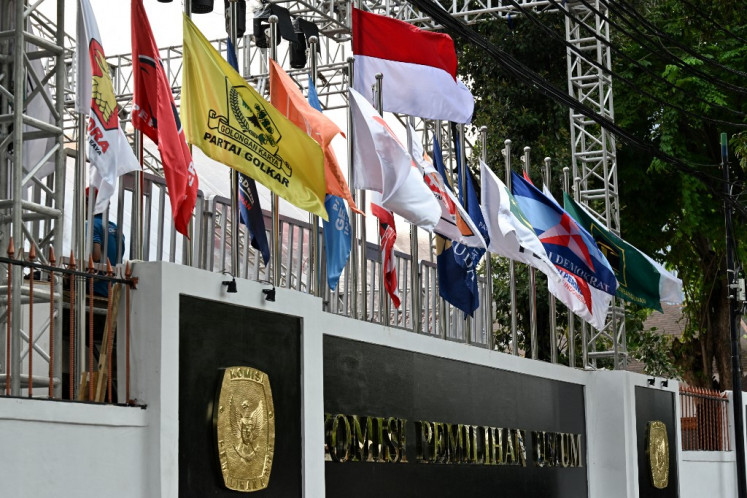Popular Reads
Top Results
Can't find what you're looking for?
View all search resultsPopular Reads
Top Results
Can't find what you're looking for?
View all search resultsTony Widya: For the love of the sport
This soft-spoken, athletic man is all smiles
Change text size
Gift Premium Articles
to Anyone
T
his soft-spoken, athletic man is all smiles. Nobody knows the good-looking schoolteacher is a pencak silat (Indonesian martial art) fighter.
He was one of the finalists in Indonesia’s contingent in the 1987 Southeast Asia (SEA) Games held in Jakarta.
“It was the first time pencak silat had been included in a regional sports event. Indonesia, as the country of origin of this art, strived hard to introduce this traditional sport to the world through this regional competition,” Tony Widya told The Jakarta Post in Yogyakarta this April.
But it was not easy to develop pencak silat into an acceptable branch of a sport to be contested in
a regional sports festival like the SEA Games.
“All participating countries would surely seek to win medals. That was the challenge for Indonesia as the source of this art,” said the 48-year-old man.
During his first experience of competing in the SEA Games, Tony was really put to the test. Central board chairman of the Indonesian Pencak Silat Association, Eddy Marzuki Nalapraya, concurrently president of the International Pencak Silat Federation (Persilat), wanted a gold medal distribution that would ensure the retention of this branch in the next SEA Games.
The strategy of pencak silat propagation through “medal distribution tolerance” would inevitably sacrifice Indonesian athletes themselves. It posed a major challenge to the country’s 16 fighters, five of whom were female athletes.
“On paper, we Indonesian athletes would definitely grab the gold medals. We had followed a very tough training schedule for nine months, all for the sake of defending Indonesia’s reputation,” Tony pointed out.
However, their greater responsibility, for the spread of pencak silat worldwide, would demand their willingness to sacrifice — hence a tougher challenge.
All of the Indonesian pencak silat athletes entered the final round of the SEA Games in 1987, held in September, and a potential 16 gold medals would certainly have increased the gold medal tally of Indonesia, which was aiming at emerging as overall champion.
“One day before the final bouts, Pak Eddy invited us to breakfast, after which he explained the strategy for pencak silat to go international. Basically, three fighters should be prepared to lose in the finals. He mentioned class A [men], class A [women], and class F [men] as would-be losers,” noted Tony.
Tony Widya’s disclosure has been acknowledged by Eddy M Nalapraya on several occasions. In 2005, when he addressed the opening of the Perisai Diri International Championship in Yogyakarta and at the world championship of the same pencak silat organization in Bandung in 2007, he revealed the give-way strategy for the spread of this art.
In class A (women) it was Rina Widawati from Jakarta, in class A (men) Deddy Marani (Papua), and in class F (men) Tony Widya (Jakarta). Their gold medals had to be “surrendered” to the contingents
of Singapore, Malaysia, and Brunei Darussalam.
“I was surprised, but ready to accept it. It was a message for the growth of pencak silat. But its implementation in the field would be very difficult. All athletes in the arena surely wished to triumph, while I was supposed to lose. How? Spectators, pencak silat lovers and my juniors all wanted me to win,” Tony said.
Tony’s opponent was Zabidi Ali from Brunei Darussalam. To show his actual capability of winning the match, Tony launched a series of effective attacks that accurately hit their targets.
A shrimp-claw technique with his legs even paralyzed Ali.
“My opponent fell. But with my barrage of assaults, he got discouraged and refrained from attacking me. I tried to get closer to him to allow his strikes, which I wouldn’t dodge,” Tony related, adding that Ali finally lunged with a light kick. The Indonesian athlete feigned injury and his official threw in the towel.
“Spectators were enraged. I still remember some of them were screaming, ‘sham match!’ My junior students were weeping as they couldn’t accept my controversial loss. They didn’t realize that for the further propagation of pencak silat, I yielded the fight,” said the teacher of Penabur Christian High School, Jakarta.
The choice of fighters that had to lose was not simple either, said Joko Widodo (50), an athlete of class B (men), in the same team of Tony Widya, from the same pencak silat club of Perisai Diri.
“I was one of those asked to yield to opponents. But an executive of the Indonesian Pencak Silat Association advised Pak Eddy that I would be too noticeable to fake defeat because of my typical fighting style. I would normally be jumping around and chasing the opponent, so it should be someone with a less aggressive style to make it less conspicuous to lose,” Joko indicated.
The two-time world pencak silat champion added that he had witnessed the selection of the three athletes as prospective losers in the finals. “All of us were surprised, but Rina looked very shocked.
Yet the strategy turned out to be successful. Pencak silat remained a branch to be contested in subsequent SEA Games,” he said.
Thirteen out of the 16 Indonesian athletes won gold medals, with the other three purposely given up to Singapore, Malaysia and Brunei Darussalam.
At the time, gold medalists received a Rp 1 million (US$110) bonus each, but the three losers still got the bonus from the association.
The three 1987 SEA Games “gold medalists” were honored by Eddy M Nalapraya on Nov. 24, 2006 in a Jakarta pencak silat gathering forum at the Pencak Silat Center at Taman Mini Indonesia Indah, Jakarta.
Eddy M Nalapraya’s strategy has been fruitful, with the worldwide expansion of pencak silat. In the SEA Games arena, the strength of pencak silat competitors has become even better as Vietnam has emerged as a major competitor. Several Indonesian coaches train athletes in Vietnam, Thailand and Laos.
Wrestling, another new branch of sport entering the 1987 SEA Games, earned Indonesia all 15 gold medals, as it did not apply the same strategy. Consequently, wrestling was not listed among the sports contested in SEA Games of later years.
Now, Tony Widya is making preparations to serve as chairman of the committee for the Perisai Diri International Championship 2010 in Jakarta, slated for July.
“I’m flattered that Sri Sultan Hamengku Buwono X, also a pencak silat fighter, was ready to host the inauguration of the young boss of PT Panasonic Gobel International as an honorary chairman of Perisai Diri on April 10, 2010. We were entertained by a Yogyakarta court dance,” said Tony.
To Tony, pencak silat is a way of life through which he discovered his identity. For the sake of this traditional art, he was ready to lose his SEA Games gold medal.
Today, he is preparing to organize a pencak silat world championship with around 500 athletes from 10 participating countries.
The strategy of pencak silat propagation through “medal distribution tolerance” would inevitably sacrifice Indonesian athletes themselves.










